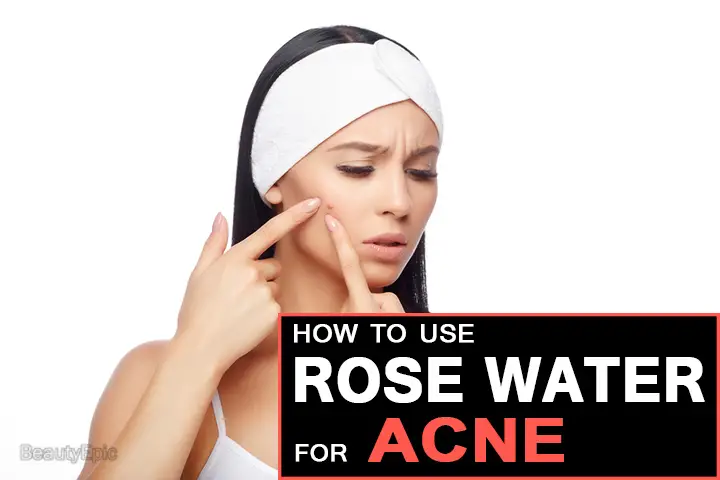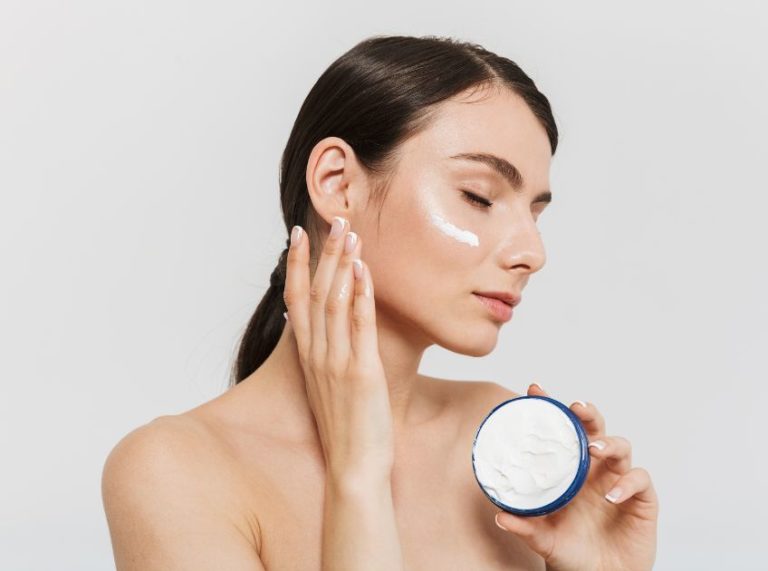
Important: This article is for informational purposes only. Please read our full disclaimer for more details.
Rosewater is an emulsion of rose oil and water. It is known for its healing and moisturizing properties, which is used to cleanse dead skin cells. Acne is a skin condition that occurs when hair follicles plug with oil and dead skin cells. It causes spots and pimples, especially on the face.
Article Contains
What Does Rose water Do for Acne?

Rosewater is an innate ingredient that is packed with healing and anti-bacterial abilities, which can efficiently treat acne. It has rich content of antioxidants that prevent the attack of free radicals on the skin to get rid of acne. Rosewater has an astringent property that cleans the pores and tones the skin.
How to Use Rose Water for Acne?
1. Rose water and Glycerin for Acne

Ingredients:
- Rosewater
- Glycerin
Preparation Time: 5 minutes.
Procedure:
- Mix rosewater and glycerin to make a powerful toner.
- Apply the toner on the skin in the acne affected parts.
How it works: Glycerin helps to balance the skin and keep it well nourished in order to avoid acne.
Repetitions: Apply 2 to 3 times daily for quick relief from acne.
2. Rose water and Lemon Juice for Acne
Ingredients:
- Rosewater
- Lemon
Preparation Time: 5 minutes.
Procedure:
- Mix 1 tablespoon each of fresh lemon juice and rosewater in a bowl.
- Apply this mix on the affected skin areas using a cotton ball.
- Leave it on for 10 minutes and rinse off with water.
How it works: Lemon with its citric acid content dries out the oil causing the acne and also lightens the acne scars.
Repetitions: Apply daily for quick relief from acne.
Tips: People with dry or sensitive skin should do a patch test before using this remedy, as lemon dries the skin and causes an allergic reaction.
[ Read: How to Treat Acne with Lemon? ]
3. Rose water Toner for Acne
Ingredients:
- Rosewater
- Apple cider vinegar
Preparation Time: 5 minutes.
Procedure:
- Mix 5 to 10 ml of raw and unfiltered apple vinegar cider in 30 ml of organic rosewater.
- Stir well and store it in a bottle.
- Shake it well and apply in skin as toner.
How it works: Apple cider vinegar treats acne with its antibacterial and anti-inflammatory properties cleanse the skin and provide relief from acne.
Repetitions: Apply daily for quick relief from acne.
4. Rose water and Sandalwood Paste for Acne
Ingredients:
- Rosewater
- Sandalwood powder
Preparation Time: 5 minutes.
Procedure:
- Mix 1 tablespoon of rosewater in 2 tablespoons of sandalwood powder in a bowl.
- Stir well to make a thick paste.
- Apply this paste on acne affected areas.
- Let it dry for few minutes then rinse off with water.
How it works: Sandalwood helps to absorb the excess oil from the skin and also soothes the skin to clear acne.
Repetitions: Repeat the process two times a day.
[ Read: How to Use Turmeric for Acne?]
5. Rose water and Witch Hazel for Acne
Ingredients:
- Rosewater
- Witch Hazel
Preparation Time: 5 minutes.
Procedure:
- Mix 3/4 of witch hazel with ¼ of rosewater to make a toner.
- Apply the toner on the skin using a cotton ball.
How it works: Witch hazel is a natural astringent which provides relief from acne.
Repetitions: Apply 2 times daily for quick relief from acne.
Tips: If your skin is dry, use half witch hazel and half rosewater.
[ Read: Is Witch Hazel Good for Acne? ]
6. Rose water Spray for Acne
Ingredients:
- Rose petals
- Distilled water
Preparation Time: 10 minutes.
Procedure:
- Combine 6 to 7 rose petals with 1.5 liters of distilled water in a spray bottle and shake.
- Spray directly on face or spray a cotton pad and wipe face to remove any residue.
How it works: Rosewater soothes and hydrates the skin to cure acne.
Tips: Store the mixture in a sealed glass container inside the fridge until ready to use.
7. Turmeric and Rose water for Acne
Ingredients:
- Rosewater
- Turmeric
Preparation Time: 15 minutes.
Procedure:
- Grind 3 inch of turmeric with rosewater.
- Stir well to make a paste.
- Apply this paste on acne affected areas.
- Leave on for 30 minutes then rinse off with cold water.
How it works: Turmeric is an excellent anti-oxidant which helps in treating the inflammation caused by pimples.
Repetitions: Repeat the process daily for a month.
[ Read: What Does Honey Do for Acne? ]
8. Multani Mitti and Rose water for Acne
Ingredients:
- Rosewater
- Multani mitti
- Lemon
- Neem powder
Procedure:
- Mix 2 tablespoons of multani mitti, 1 tablespoon of rosewater, 1 tablespoon neem powder along with ½ teaspoon of lemon juice, to make a smooth mixture.
- Apply this paste on acne affected areas.
- Leave it on for few minutes and rinse with cool water.
How it works: Multani mitti is a rich source of magnesium chloride, which helps fight acne and prevents breakouts.
Repetitions: Repeat the process twice a week.
Preparation time: Preparation time is 2 minutes.
9. Besan and Rose water for Acne
Ingredients:
- Rosewater
- Besan or Gram flour
Preparation Time: 5 minutes.
Procedure:
- Mix 2 tablespoons of besan with 2 to 3 tablespoons of rosewater until it becomes a smooth paste.
- Apply this paste on acne affected areas.
- Let it dry for 30 minutes.
- Wash with cool water in circular motions.
- Pat your skin dry and apply a moisturizer.
How it works: Besan or Gram flour has alkalizing properties and is used as a cleanser to maintain the pH of the skin to reduce acne.
Repetitions: Repeat the process twice a week.
10. Baking Soda and Rose water for Acne
Ingredients:
- Rosewater
- Baking soda
Preparation Time: 5 minutes.
Procedure:
- Mix 1 teaspoon of baking soda with enough rosewater to make a paste.
- Apply this paste on acne affected areas.
- Leave it on for 1 to 2 minutes and rinse with cold water.
How it works: Baking soda cures acne by exfoliating the skin to unclog the skin pores and balances the pH of the skin to reduce the acne breakouts.
Repetitions: Repeat the process daily.
Rosewater is one of the best natural remedies for treating acne since ancient days. It is very effective in not only treating acne but also fades away the leftover acne scars on the skin. It acts as a natural skin toner that helps to tighten the skin pores, absorbs excess oil and provides relief from acne scars, wrinkles, and fine lines.
You Might Also Like
- How to Use Apple Cider Vinegar for Acne?
- Is Baking Soda Good for Acne?
- How To Use Witch Hazel To Treat Acne?
- How Does Sulfur Help with Acne?
- 7 Best Setting Sprays For Acne Prone Skin
- The 10 Best Essential Oils For Acne Scars
- How to Use Turmeric for Acne?
- How Do You Get Rid of Acne with Lemon Juice?
- Does Rubbing Alcohol Get Rid of Acne?
- How To Use Apple Cider Vinegar For Acne Treatment?
- How to Use Aspirin for Acne Treatment?
- Top 5 Best Vitamins to Prevent Acne
- How to Use Olive oil for Acne Treatment?
Image:- 1















